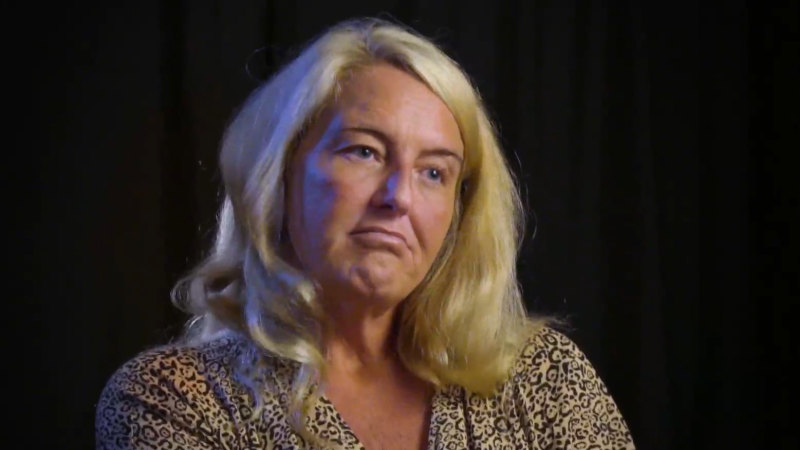The Andrews government has been forced to put its controversial police informer laws on ice for at least two months after being met with near-universal condemnation from the opposition, Greens, crossbenchers and the legal sector.
The bill was due to be debated on Thursday, but the government pulled the bill from debate in the upper house at the eleventh hour after the Greens announced they would not pass it in its current form.
It is the latest blow to the government’s faltering Human Source Management Bill, drafted in response to Justice Margaret McMurdo’s royal commission into Victoria Police’s use of barrister Nicola Gobbo to inform on her gangland clients.
The opposition and legal profession argue that allowing police to register lawyers to inform on their own clients – even in rare circumstances – undermines one of the fundamental principles of the legal system.
Barrister Nicola Gobbo in 2019.Credit:ABC
The Greens have raised serious concerns about the lack of adequate protections for children registered as informers, and a lack of effective independent oversight of the recruitment of police informers.
The Media, Entertainment and Arts Alliance joined the chorus of condemnation late on Thursday, warning the draft laws – which would empower Victoria Police to register lawyers, journalists, priests and children as informers – risked creating a “house of cards” that could erode the public’s right to know information.
The opposition had also circulated proposed amendments that would prevent lawyers from informing on their clients under any circumstances. The upper house will not sit again until May 2, which is the earliest the bill can now be debated.
Media, Entertainment and Arts Alliance federal media president Karen Percy urged the government to amend the bill to ensure journalists could never be used as government sources.
“We are deeply concerned that the Victorian government is even considering legislation that would allow journalists to be enlisted as police informants,” Percy said.
“Any such arrangement would compromise journalists’ ethical obligations to protect sources … Once trust is compromised in a journalist-source relationship, it becomes a house of cards where sources will be reluctant to come forward and, as a result, the public will be denied important information.”
The bill was to give police discretion to register children, lawyers, journalists, doctors, priests, parliamentarians and judges as human sources.
It was met with strong condemnation from legal groups, including the Law Institute of Victoria, Victorian Bar, Law Council of Australia, Australian Lawyers Alliance, and the Australian Bar Association, which called for the bill in its current form to be scrapped.
LIV president Tania Wolff welcomed news the bill would be postponed while negotiations continued.
“This is an important piece of legislation. It is important for the community that we get it right,” she said.
“At the end of all this, the bill that passes has to properly respond to the reason why we had a Royal Commission, without in any way creating a framework for lawyers to be used to inform on their clients.”
Attorney-General Jaclyn Symes in the upper house, where the bill was due to be debated on Thursday.Credit:Joe Armao
Attorney General Jaclyn Symes had already moved on Wednesday to strengthen protections for lawyers, adding a series of amendments.
They included requiring police members to gain the approval of the chief commissioner of police before registering a person as an informer. Police would also need to convince the Supreme Court there was an imminent risk to public safety or national security before using lawyers and others as informers.
Symes also flagged a prohibition on “tasking” (giving instructions to) lawyers who had access to legally privileged information, to seek information from their clients.
Symes said on Thursday some crossbenchers had asked for more time to consider the changes and “in the spirit of negotiating in good faith” the government had agreed to bring the bill back during the next sitting week.
“This bill proposes the most robust police informant management system of anywhere in Australia, and it acquits the recommendations of the Royal Commission,” she said. “Victorians deserve nothing less to ensure what happened with Ms Gobbo cannot happen again.
“We have been consulting and working extensively with members of the crossbench and the legal sector on the bill.”
However Liberal attorney general spokesman Michael O’Brien said as it stands, the changes within the bill could lead to “another Lawyer X”.
O’Brien consulted extensively with legal groups before drafting amendments and circulating them to colleagues. Those further changes would give a retired judge the power to oversee the registration of informers, rather than the chief commissioner of police.
He cited the hypothetical example of a lawyer living next door to a meth lab. That lawyer could still inform the police about criminal activity under the proposed changes to the laws.
“Lawyers could still act as informers, just not in their capacity as lawyers,” O’Brien said.
The Morning Edition newsletter is our guide to the day’s most important and interesting stories, analysis and insights. Sign up here.
Most Viewed in Politics
From our partners
Source: Read Full Article





